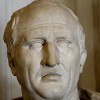“ The better and more noble, therefore, the character with which a man is endowed, the more does he prefer the life of service to the life of pleasure. Whence it follows that man, if he is obedient to Nature, cannot do harm to his fellow-man. ”
Marcus Tullius Cicero, On Duties (44 BC). copy citation
| Author | Marcus Tullius Cicero |
|---|---|
| Source | On Duties |
| Topic | pleasure life |
| Date | 44 BC |
| Language | English |
| Reference | |
| Note | Translated by Walter Miller |
| Weblink | http://www.constitution.org/rom/de_officiis.htm |
Context
“{25} In like manner it is more in accord with Nature to emulate the great Hercules and undergo the greatest toil and trouble for the sake of aiding or saving the world, if possible, than to live in seclusion, not only free from all care, but revelling in pleasures and abounding in wealth, while excelling others also in beauty and strength. Thus Hercules denied himself and underwent toil and tribulation for the world, and, out of gratitude for his services, popular belief has given him a place in the council of the gods. The better and more noble, therefore, the character with which a man is endowed, the more does he prefer the life of service to the life of pleasure. Whence it follows that man, if he is obedient to Nature, cannot do harm to his fellow-man. {26} Finally, if a man wrongs his neighbour to gain some advantage for himself he must either imagine that he is not acting in defiance of Nature or he must believe that death, poverty, pain, or even the loss of children, kinsmen, or friends, is more to be shunned than an act of injustice against another.”
source



